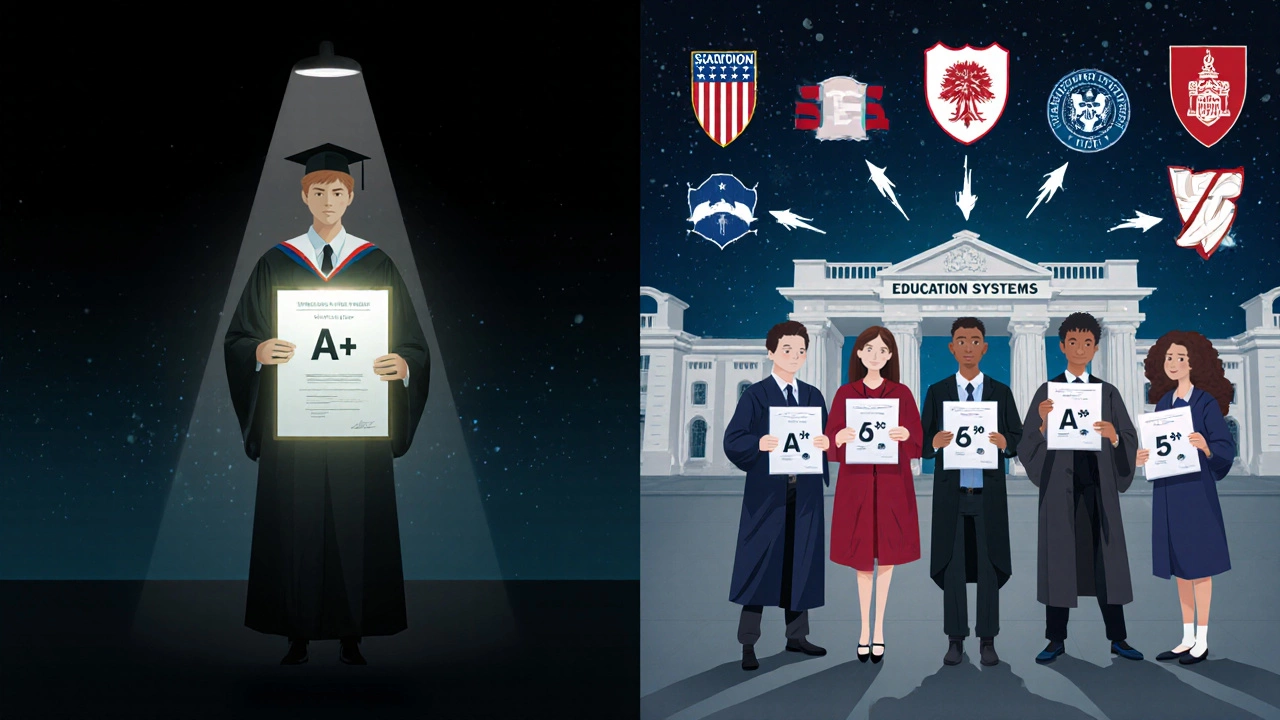If you’re trying to decide between A-Levels and APs, you’re not alone. Students from the UK, Ireland, and beyond often wonder: are these two systems just different names for the same thing? The short answer is no. They’re built on completely different ideas about learning, assessment, and what colleges expect. Understanding the difference isn’t just academic-it can shape your entire education path.
What Are A-Levels?
A-Levels, short for Advanced Levels, are the main qualification for university entry in the UK and Ireland. Most students take them after completing GCSEs, usually between ages 16 and 18. You typically choose three to four subjects to study in depth over two years. There’s no general education requirement-you don’t have to take math if you’re focused on art, history, or biology. That’s the point: A-Levels let you specialize early.
Assessment is almost entirely based on final exams at the end of Year 13. Coursework exists in a few subjects like art or science, but it’s usually a small part of the grade. The grading scale is A* to E, with A* being the highest. Universities in the UK, including Oxford and Cambridge, often make offers based on specific A-Level grades-like A*AA in three subjects.
What Are AP Exams?
AP, or Advanced Placement, is a U.S.-based program run by the College Board. It’s not a standalone qualification like A-Levels. Instead, it’s a set of college-level courses you can take while still in high school, usually during your junior or senior year. There are over 30 AP subjects, from Calculus to Art History to Environmental Science.
What makes AP different is that it’s designed to be taken alongside a regular high school curriculum. Most U.S. high school students take 8-10 classes per year, including core subjects like English, math, science, and social studies. AP classes are just one of those courses. At the end of the year, you take a standardized exam scored from 1 to 5. A score of 3 or higher can earn you college credit in the U.S., depending on the university.
Structure: Depth vs. Breadth
A-Levels demand deep focus. If you take Biology, Chemistry, and Physics, you’re expected to master those subjects at a university-level standard. You don’t take English Literature or History unless you choose them. This means you become an expert in your chosen areas.
AP, on the other hand, is about breadth. Even if you take five AP exams, you’re still taking other non-AP classes. A typical U.S. high schooler might take AP Biology, AP English, AP U.S. History, AP Calculus, and AP Psychology-all while also doing gym, electives, and required courses. The goal isn’t to become a specialist by 18; it’s to show you can handle college-level work across multiple areas.

Assessment: One Big Exam vs. Year-Long Work
A-Level grades are decided mostly by end-of-course exams. There’s little room for recovery if you have a bad day. Preparation is intense, and revision often starts months in advance. The exams are long-sometimes three hours-and written in a way that tests deep understanding, not just recall.
AP exams are also one-off, but they’re shorter and more multiple-choice heavy. You still write essays, but they make up less of the total score than in A-Levels. The College Board designs AP exams to be taken by millions of students annually, so they’re standardized for scalability. A score of 5 on an AP exam doesn’t mean you’re the top student in your class-it means you scored in the top 10-15% globally.
Recognition: Where Do They Matter?
If you’re applying to a university in the UK, A-Levels are the gold standard. Admissions officers know exactly what an A* in Physics means. APs are rarely accepted as direct entry qualifications in the UK. Some universities might consider them as supplementary evidence, but they won’t replace A-Levels.
In the U.S., APs are widely recognized. Top schools like Harvard and Stanford expect strong AP scores as proof of academic rigor. But if you’re an international student with A-Levels, U.S. colleges treat them as equivalent to APs-sometimes even more highly. Many U.S. universities say A-Levels are more challenging because of their depth.
For Canada, Australia, and Europe, both are accepted, but A-Levels are often preferred because they’re more aligned with their own education systems. APs are seen as a strong addition, especially if you’re applying from the U.S.
What Universities Really Want
Universities don’t care whether you took A-Levels or APs-they care about what you achieved and how you used your time. A student with three A* grades in A-Levels and no extracurriculars might be less impressive than a student with four AP scores of 5, plus research, volunteering, and a part-time job.
The real question isn’t which is better. It’s which fits your learning style. If you thrive in focused, exam-driven environments and want to dive deep into three subjects, A-Levels make sense. If you like variety, want to test yourself across disciplines, and plan to apply to U.S. colleges, APs give you flexibility.

Can You Take Both?
Yes-but it’s rare and demanding. Some international schools, especially in places like Dubai, Singapore, or Hong Kong, offer both systems. A student might take A-Levels in core subjects and APs in electives like Computer Science or Economics. But this requires extra time, resources, and often private tutoring. Most students pick one path and go all in.
Which One Should You Choose?
Ask yourself three questions:
- Where do you want to go to university? If it’s the UK or Ireland, A-Levels are your best bet. If it’s the U.S., APs are the standard.
- Do you prefer deep focus or broad exposure? A-Levels are for specialists. APs are for generalists.
- How do you handle pressure? A-Levels put everything on final exams. APs spread pressure across the year, but you’re juggling more subjects at once.
There’s no universal winner. The right choice depends on your goals, your strengths, and where you’re headed next.
Are A-Levels harder than APs?
It depends on how you define "hard." A-Levels are more focused-you study fewer subjects but at a deeper level, with exams that require detailed written responses. APs cover more subjects but with lighter content per class and more multiple-choice questions. Many U.S. universities consider A-Levels more rigorous because of their depth. UK universities often say APs are easier to score highly on, but less predictive of university success.
Can I use APs to get into Oxford or Cambridge?
Oxford and Cambridge rarely accept APs as direct entry qualifications. They expect A-Levels, IB, or equivalent UK-level qualifications. If you’re applying from the U.S. with APs, you’ll need to meet specific requirements-like three AP scores of 5 plus SAT/ACT scores and strong personal statements. But even then, you’ll be competing against applicants with A-Levels or IB, who are the norm at these schools.
Do APs give you college credit in the UK?
Generally, no. UK universities don’t use AP scores to grant credit or advanced standing. They look at your overall qualification-like A-Levels or IB. Some universities might accept AP scores as proof of ability if you’re applying from abroad, but they won’t count them toward your degree requirements. A-Level grades are what matter.
Which is better for STEM subjects?
For STEM, A-Levels in subjects like Physics, Chemistry, and Maths are highly respected worldwide. They’re known for their mathematical rigor and lab-based assessments. AP Science courses are strong too, but they’re often less math-intensive and more conceptual. If you’re aiming for engineering or medicine at top UK or European universities, A-Levels give you a clearer advantage. For U.S. universities, both are acceptable, but A-Levels are seen as more challenging.
Can I switch from APs to A-Levels mid-way?
It’s possible but very difficult. A-Levels are a two-year program starting after GCSEs (age 16). If you’re already in your junior year of U.S. high school taking APs, switching to A-Levels would mean repeating Year 12 and starting from scratch. Most schools don’t allow it unless you’re transferring systems entirely. Planning ahead is key-if you’re thinking about A-Levels, start in Year 12.
Final Thoughts
A-Levels and APs aren’t interchangeable. They’re designed for different education systems, different student profiles, and different university expectations. Trying to treat them as the same leads to confusion-especially when applying to universities abroad. The best choice isn’t about prestige. It’s about alignment: which system matches your strengths, your goals, and the path you want to take after school?
If you’re in the UK or planning to study here, A-Levels are your foundation. If you’re in the U.S. or targeting American universities, APs are the natural route. But if you’re an international student weighing both, remember this: universities care more about what you achieved than what you called it. A strong performance in one system will always outweigh a mediocre one in the other.






